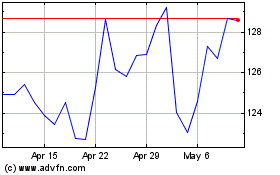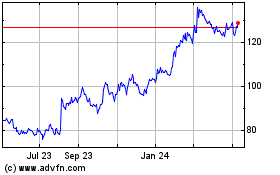Express Scripts to Offer a Way to Lower Insulin Costs -- Update
04 April 2019 - 9:31AM
Dow Jones News
By Joseph Walker
One of the largest managers of prescription-drug benefits will
offer clients the option of limiting how much diabetics owe
out-of-pocket each month for their insulin, the latest step by a
health-care company under pressure to curb drug costs.
Express Scripts, a pharmacy-benefit manager owned by health
insurer Cigna Corp., said Wednesday it will immediately begin
offering employers, labor unions and other clients the option to
cap at $25 a month the copayments and other out-of-pocket costs
that diabetics must pay to fill their insulin prescriptions.
The cap, if picked up by employers, would save the average
patient about $15 a month, or 40%, and even more for patients
covered under a typical high-deductible health plan, according to
Express Scripts. Patients could start benefiting from the lower
out-of-pocket costs in the next few months, depending on when
employers decide to opt-in, a company spokesman said.
The offering will include all insulin types, including those
made by Eli Lilly & Co., Novo Nordisk AS and Sanofi SA, three
of the biggest makers of diabetes drugs. Express Scripts and Cigna
insure about 700,000 patients taking insulin, said Glen Stettin,
chief innovation officer at Express Scripts.
"Lowering the high out-of-pocket costs some people pay at the
pharmacy for insulin is our priority," a Lilly spokesman said in an
email. "We're glad Express Scripts is looking for ways to make that
happen, and we support their efforts."
Novo Nordisk is "working closely with [Express Scripts] to
finalize our participation in this effort," a Novo spokesman
said.
A Sanofi spokeswoman said the collaboration was part of its
effort to make its medicines accessible and affordable to
patients.
The rising list prices for insulin have figured prominently in
mounting criticism of drug costs. Patients, doctors and lawmakers
have criticized Lilly, Novo Nordisk and other drugmakers for
raising prices, while the pharmaceutical companies have sought to
shift blame to the pharmacy-benefit managers.
Amid the scrutiny, Lilly said last month it would introduce a
generic version of Humalog, among the most widely used insulins, at
half the list price of the brand-name product.
The drug company released data last week saying the sum it was
paid for Humalog had dropped $12 to $135 a patient a month last
year from 2014, as a result of the rebates and other discounts it
paid to PBMs, while the list price increased 52% during that
time.
The Trump administration and members of Congress have picked up
on the criticism of PBMs, saying the health-care companies have
been able to collect ever-larger rebates as a result of the price
increases.
The Senate Finance Committee is conducting an investigation into
insulin prices and has sent detailed information requests to
insulin-makers and PBMs including Express Scripts as part of the
probe. Committee Chairman Sen. Chuck Grassley (R., Iowa) on
Wednesday questioned the timing of the Express Scripts insulin
program.
"Why couldn't this have been done years ago?" Mr. Grassley said
in a statement. "It shouldn't take bad press and congressional
scrutiny to get health plans, their pharmacy benefit managers and
pharmaceutical companies to arrive at a fair price for a drug
that's been on the market for nearly a century."
The average out-of-pocket cost for insulin for a typical patient
insured by Cigna or Express Scripts last year was $41.50 a month,
Express Scripts said. Many patients in high-deductible health plans
paid an average of about $100 per monthly prescription.
Health-plan sponsors, such as employers and labor unions, will
have to opt-in to an out-of-pocket cap program in order for
patients to benefit from it, according to Express Scripts. The PBM
isn't making the program available to government-funded health
plans, which often have restrictions on pharmaceutical companies
helping to pay patients' out-of-pocket costs.
The Express Scripts program will be funded with a new pot of
money that some drugmakers agreed to pay to the PBM to offset
patient out-of-pocket costs, Dr. Stettin said. That money is
separate from the rebates that insulin-makers already pay to
PBMs.
"We figured out a way to get additional money from the
pharmaceutical manufacturers," Dr. Stettin said in an interview.
"They're reinvesting money they could've spent elsewhere and
helping us make the insulin more affordable to the patients that we
serve."
Write to Joseph Walker at joseph.walker@wsj.com
(END) Dow Jones Newswires
April 03, 2019 18:16 ET (22:16 GMT)
Copyright (c) 2019 Dow Jones & Company, Inc.
Novo Nordisk (NYSE:NVO)
Historical Stock Chart
From Mar 2024 to Apr 2024

Novo Nordisk (NYSE:NVO)
Historical Stock Chart
From Apr 2023 to Apr 2024
